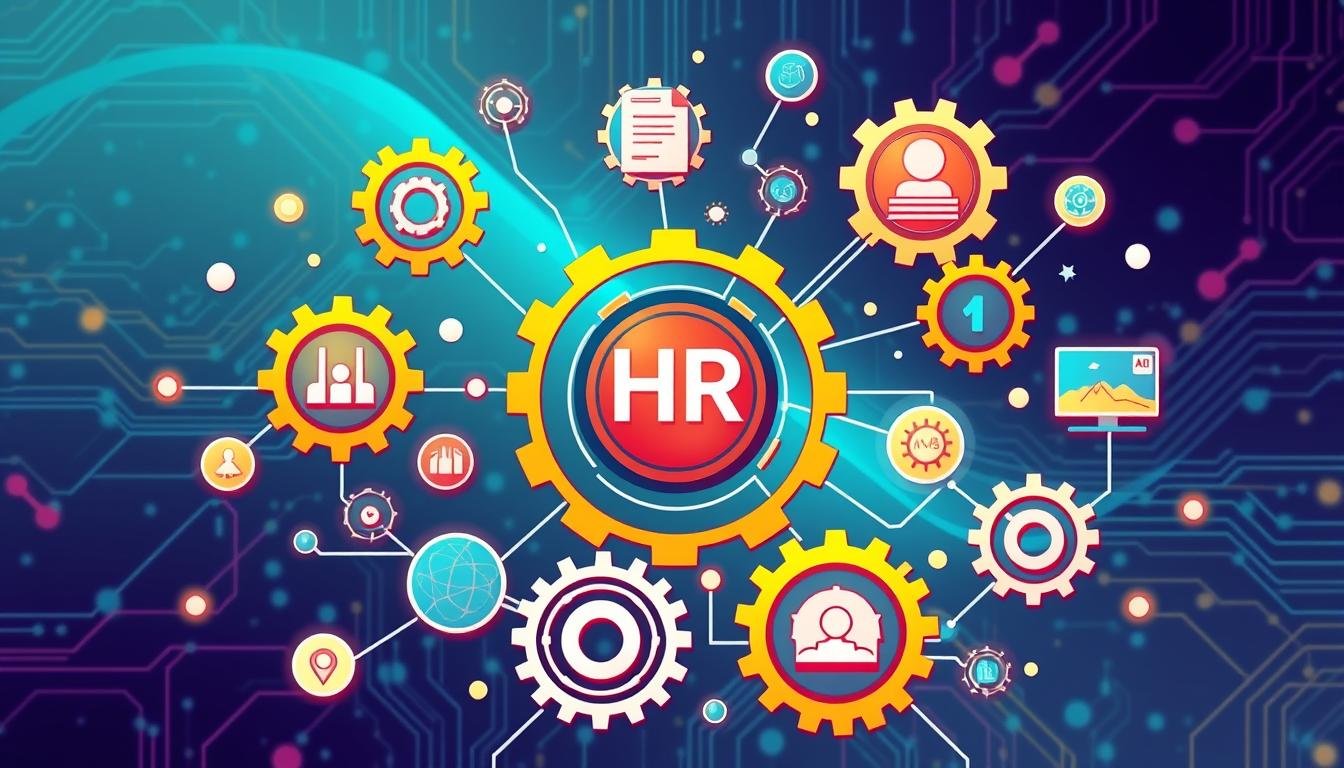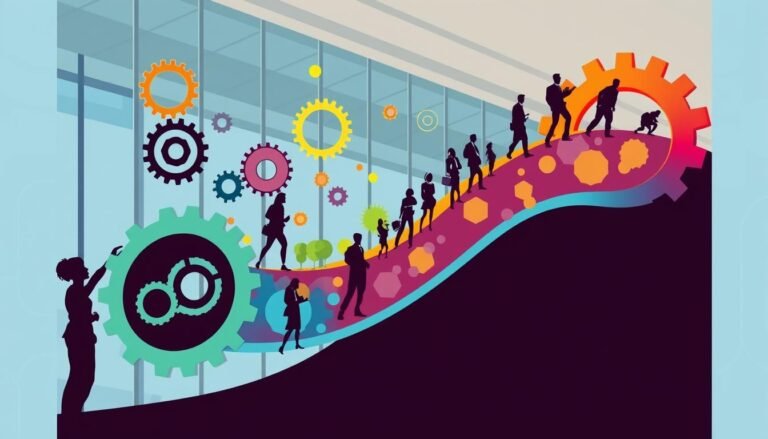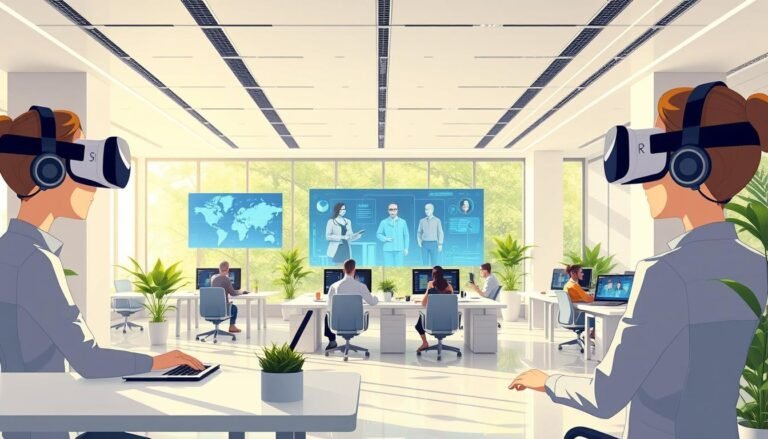HR Tech Ecosystem: Integrating Advanced Solutions
The HR tech world is changing fast. The global Human Resource Technology Market was worth USD 156.98 billion in 2022. This shows businesses are spending a lot on new solutions. The market is set to grow, reaching USD 237.42 billion by 2030, with a 5.41% CAGR.
Human Resource Management Systems are leading this change. They are more than tools; they are key assets for organizations. They help in managing everything from hiring to keeping employees happy.
HR Analytics and Big Data are making a big impact. They help HR teams make smart choices based on data. This way, companies can understand their employees better.
But, it’s key to remember that tech is just a tool. Its success depends on the strategy it supports. Companies need to understand their needs and adopt new tech gradually for success.
Key Takeaways
- The HR Tech market is growing rapidly, expected to reach $237.42 billion by 2030
- Human Resource Management Systems are transforming HR processes
- HR Analytics and Big Data are enabling data-driven decision making
- Technology effectiveness depends on the strategy it supports
- A phased approach is crucial for successful HR tech integration
Understanding the HR Tech Ecosystem
The HR tech ecosystem has changed how companies engage with their workforce. It covers many areas, from finding new talent to keeping current employees happy. This has changed how businesses handle their human resources.
Definition of HR Tech
HR tech is a set of digital tools and platforms for managing human resources. It includes things like Talent Acquisition Software and Cloud-based HR Solutions. These tools use Artificial Intelligence in HR to help manage employees.
Importance of Integration
Integration is key for HR tech to work well. It connects different systems for a smooth flow of data. This gives a clear view of the workforce, making processes more efficient and decisions better informed.
- Over 650 HR tech projects delivered to more than 300 HR leaders in the past two decades
- Top challenges: ensuring ongoing adoption, justifying investments, and developing strategic roadmaps
- The Transition Phase (6-12 months post-launch) is critical for HR transformation success
The HR tech world includes many professionals from different fields. Chief People Officers, Heads of HR Technology, and VPs of Learning & Development are all important. Companies like Deloitte, Oracle, and Microsoft lead in developing and using these technologies.
“An empowered workforce, data-driven leadership, and a culture of innovation are key indicators of a successful HR tech ecosystem.”
As HR tech keeps growing, companies need to keep improving their systems. This is to get the best results and stay ahead in managing talent.
Key Components of HR Technology
HR technology has changed a lot since the early 2000s. Cloud-based solutions have made a big impact. Now, the HR tech world has several key parts that help make work easier and better for employees.
Recruitment Solutions
Today’s recruitment tools use AI and machine learning. They change how companies find and check out candidates. These tools help screen candidates, set up interviews, and give insights on who fits best, saving time and making hiring better.
Onboarding Tools
Good onboarding is key for new employees to do well. Digital onboarding platforms offer self-service, automate paperwork, and have interactive training. This makes starting new easier and cuts down on HR’s work.
Employee Engagement Platforms
Engagement platforms use surveys, feedback tools, and analytics to boost employee happiness. They often have social features, recognition programs, and tools for setting goals. This helps build a positive work environment.
| Component | Key Features | Benefits |
|---|---|---|
| Recruitment Solutions | AI-powered screening, Interview scheduling | Time savings, Improved candidate quality |
| Onboarding Tools | Self-service portals, Automated paperwork | Smoother transitions, Reduced admin work |
| Engagement Platforms | Surveys, Recognition programs | Improved satisfaction, Stronger culture |
By combining these parts, companies can make a smooth HR system. It supports employees from start to finish. This not only makes work more efficient but also gives valuable data for making smart choices.
Benefits of Integrating HR Solutions
Integrating HR solutions offers many benefits to companies. By combining different HR tools, organizations can create a smooth system. This boosts efficiency and productivity for everyone.
Streamlining Processes
HR Analytics and Big Data are key in making HR processes smoother. By linking various systems, companies can automate tasks and cut down on manual work. For example, HubSpot’s team integration led to a 20% jump in employee happiness in just a year.
Enhancing Employee Experience
Employee Engagement Platforms are vital for better employee experiences. Microsoft’s benefits platform made 79% of employees choose extra benefits over a raise in 2021. This shows how integrated solutions can increase happiness and keep employees longer.
Data-Driven Decision Making
Integrated HR solutions help make decisions based on data. A study by HR Technologist found that companies using different HR tech saw an 18% rise in keeping employees and a 32% boost in productivity.
| Company | Integration Result | Impact |
|---|---|---|
| Salesforce | Personalized benefits packages | 90% employee satisfaction rate |
| Netflix | Tailored benefits | 93% employee retention over 5 years |
| CrestTech | Benefits Management System | 45% increase in engagement, 20% decrease in turnover |
These numbers show how integrating HR solutions can greatly improve employee satisfaction, retention, and company performance. By using HR Analytics and Big Data, companies can make smart choices that lead to success.
Challenges in HR Tech Integration
Integrating Human Resource Management Systems is tough for companies. Even with the benefits of Cloud-based HR Solutions, there are many obstacles to overcome.
Resistance to Change
Introducing new HR tech often faces pushback from employees and HR teams. A study shows 25% of HR leaders admit to employee frustration with using many tools for HR tasks. This resistance can make things slower and cause delays.
Data Security Concerns
With laws like GDPR and CCPA, keeping employee data safe is a big deal. This is especially true for Cloud-based HR Solutions, where data security is a major concern.
Compatibility Issues
HR tech stacks are often not compatible. Many companies use different tools, leading to data silos and inefficiencies. The lack of interoperability between systems can make integration projects costly and time-consuming.
| Challenge | Impact | Potential Solution |
|---|---|---|
| Resistance to Change | Slowed processes, employee frustration | Comprehensive training and support |
| Data Security Concerns | Compliance risks, data breaches | Robust security measures, regular audits |
| Compatibility Issues | Inefficiencies, data silos | Choosing integrated HR management systems |
To overcome these challenges, companies need a good plan and partners who focus on support and compliance. By picking the right Human Resource Management Systems and Cloud-based HR Solutions, organizations can make the most of their HR tech.
Top Advanced HR Tech Solutions
HR technology has grown a lot, offering advanced tools to make work easier and better for employees. Let’s look at some top solutions changing the HR world.
Applicant Tracking Systems
Talent Acquisition Software is key for today’s hiring. It automates finding, screening, and tracking candidates, cutting down hiring time. With AI, it matches jobs with the right candidates better, leading to better hires.
Learning Management Systems
Learning and Development Solutions have changed how we train employees. They offer custom learning paths, interactive content, and track progress. This helps companies keep their teams skilled and ready for new challenges.
Performance Management Tools
Modern performance management tools do more than just yearly reviews. They give ongoing feedback, track goals, and show performance in real-time. These tools help create a culture of constant growth and meeting company goals.
| HR Tech Solution | Key Benefits | Adoption Rate |
|---|---|---|
| Applicant Tracking Systems | Reduced time-to-hire, improved candidate quality | 78% |
| Learning Management Systems | Personalized learning, skill development | 83% |
| Performance Management Tools | Continuous feedback, goal alignment | 72% |
These advanced HR tech solutions are making big changes in hiring, training, and managing performance. As more companies use these tools, they see better work, happier employees, and stronger business results.
The Role of AI in HR Tech
Artificial Intelligence in HR is changing how companies manage their teams. It makes hiring faster and improves how employees feel at work. AI tools are making HR better in many ways.
Automating Recruitment
AI is making hiring faster and more efficient. HR Chatbots and Virtual Assistants can do initial screenings, freeing up HR’s time. AI can match candidates to jobs with great accuracy.
AI cuts screening time from days to hours. This lets HR teams do more important work. AI also helps avoid bias, making hiring fairer.
Personalized Employee Experiences
AI is also making work better for employees. It offers personalized learning and onboarding. AI helps manage performance, making work more engaging.
| AI Application | Impact on HR |
|---|---|
| Resume Screening | 90% reduction in time spent |
| Candidate Matching | 50% improvement in hire quality |
| Employee Engagement | 30% increase in retention rates |
AI brings many benefits, but we must think about ethics. It’s important to ensure AI in HR is fair, open, and respects privacy. This builds trust and a good work environment.
Future Trends in HR Technology
The HR tech world is changing fast, with new ideas coming up. HR Analytics and Big Data are leading this change, changing how companies handle their teams. Let’s look at two big trends that will change HR forever.
Predictive Analytics
Predictive analytics is changing HR. By 2025, generative AI will create 10% of all data. This will help HR teams make better choices. Tools for managing the workforce are getting smarter, predicting talent needs and improving hiring.
Remote Work Solutions
The pandemic changed how we work, making remote work key. HR tech is adjusting to this new way:
- 53% of HR leaders focus on organizational design and change management for 2024
- 45% say employee fatigue comes from too many changes
- Employee support for changes dropped from 74% in 2022 to 38% in 2024
HR tech is working on better remote teamwork, virtual onboarding, and keeping employees engaged online. Tools like Oyster help companies work well with teams spread out.
“The future of HR technology lies in its ability to harness data for predictive insights while supporting flexible work models.”
HR technology will keep growing, with AI and data playing big roles in managing teams.
Implementing an Integrated HR Tech Strategy
The global HR software market is growing fast, expected to hit over $44.28 billion by 2031. This shows how key it is to have a solid HR tech strategy. Human Resource Management Systems are getting better, making work easier and more efficient.
Assessing Current Needs
Before adding new tech, companies need to check their HR processes. This step reveals what’s working and what needs a boost. For example, INTRASIPA Group saw a 25% jump in HR productivity with the right tools.
Choosing the Right Tools
Picking the right Human Resource Management Systems is essential. They should match the company’s goals and grow with it. Alpine, for instance, improved employee happiness with a simple yet effective tool.
Training and Support
Good training and support are key when introducing new tech. This helps everyone get used to it quickly and enjoy its benefits. Vitamine T saved $200,000 a year by wisely using HR tech.
| Benefits of Integrated HR Tech Strategy | Impact |
|---|---|
| Streamlined Operations | Interconnected HR software eliminates complexities |
| Cost Optimization | Reduced duplication, lower overall costs |
| Enhanced Employee Experience | Higher satisfaction and engagement levels |
| Improved Productivity | Automation of repetitive tasks, focus on strategic initiatives |
By carefully looking at needs, picking the best tools, and training well, companies can make their HR tech strategy work. This leads to better efficiency and innovation.
Measuring Success in HR Tech Integration
The HR tech world has changed a lot. Tools like HR Analytics and Big Data are now key for managing workforces. It’s important to set clear goals and keep improving your methods.
Key Performance Indicators
It’s crucial to track the right KPIs to measure HR tech success. Look at employee productivity, retention rates, and how long it takes to hire someone. For example, companies that invest in HR tech spend 25% more on keeping employees. This leads to a 15% better retention rate.
Employee Engagement Platforms also show great results. Some companies see a 30% boost in finding the right candidates with analytics.
Continuous Improvement Techniques
To stay on top in HR tech, you must keep improving. Regularly check your systems and listen to what users say. Netflix, for instance, doubled candidate satisfaction by using chatbots.
This shows how important it is to keep updating your HR tech strategy. Also, 54% of companies think it’s key to upgrade their HR tech to better employee experience and make processes smoother.
By focusing on these areas, companies can keep their HR tech in line with their goals. The aim is to build a strong, data-driven HR setup that helps both employees and the business.
Source Links
- The Realities of HR Tech Part 1 : Guiding You Through the Noise – Transform
- The Evolution of HR Ecosystems: Transforming Chaos into Cohesion
- New Products Debuting at HR Tech 2024
- Your HR Tech Survival Guide Beyond Go-Live
- HR Technology Conference Agenda 2024
- No one is good at everything: why the evolution of HR Technology depends on partnership ecosystems.
- HR Technology has Emerged as the Top Priority for HR Investments for the Second Consecutive Year – Slate Professional Resources, Inc.
- Integrating Benefits Management Systems with HR Technology: Best Practices and Trends
- Diving Into The Transformative Benefits Of HRIS | Aspen HR
- The Pros And Cons Of Integrating Different Hr Technology Platforms – AirMason Blog
- Breaking Down Barriers: Today’s Biggest Challenges in HR Tech Integration
- HR Technology Challenges & Ways to Overcome Them – Yellow.ai
- 8 common HR technology challenges and how to overcome them
- What is New in HR Technology? A Comprehensive Overview – Flexiele
- 10 HR Technology Trends for 2024
- The Future of HR Tech: How AI Is Transforming Human Resources
- Revolutionizing Talent Acquisition: The Role of AI in HR Tech
- 2024 HR Technology Trend Predictions
- HR Technology Trends for 2024
- HR Technology Strategy: How HR Leaders Can Succeed
- 3 Success Stories to Inspire your HR Technology Strategy
- Robusta Technology Group | How We Used Tech To Supercharge Our HR Process
- Integrating HR Technology in the Startup Ecosystem – FasterCapital
- Integrating Recruitment Automation with Existing HR Technologies








